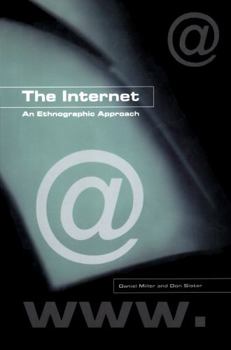The Internet: An Ethnographic Approach
Select Format
Select Condition 
Book Overview
This pathbreaking book is the first to provide a rigorous and comprehensive examination of Internet culture and consumption. A rich ethnography of Internet use, the book offers a sustained account not... This description may be from another edition of this product.
Format:Paperback
Language:English
ISBN:1859733891
ISBN13:9781859733899
Release Date:July 2001
Publisher:Routledge
Length:228 Pages
Weight:0.78 lbs.
Dimensions:0.5" x 6.1" x 9.1"
Customer Reviews
1 rating
The best of academic thinking
Published by Thriftbooks.com User , 23 years ago
"The Internet: an Ethnographic Approach" represents the very best of academic thinking and theorizing on the subject of the 'internet'. Miller and Slater provide us with a remarkable perspective on the ways in which real people, in this case Trinidadians (at home and across all the far flung points of the globe), use the internet. I was lucky enough to read this book in draft and have been eagerly waiting for its release so that I can share it around.Here the internet is not just about the dot.com economy and the rush to get rich, rather it is an amazing constellation of technologies that help strengthen and reinvent families, that create new idioms and icons of identity, that allow new places and spaces to be Trinidadian. The book is rich with stories of mothers who can now keep in daily touch with their daughters in the UK and the US; of messages that pass from pieces of paper to email and back to paper again as they are transmitted between households without internet access; of websites all over the world that employ the same set of coherent Trinidadian symbols to project a nation's identity onto the world screen.This collaboration is the first, hopefully of many, between Daniel Miller - a British anthropologist whose previous work theorizing consumption is just starting to be read in the US - and Don Slater - a British sociologist who most recently conducted fieldwork in online communities in the UK. It represents the emergence and convergence of several important trends: (1) the serious study of `the internet' as a set of social practices (not just a piece or pieces of technology) that map onto real, rather than virtual geographies; (2) the possibility for new kinds of field methods that map onto these new technologies and new social practices - perhaps `fieldwork' isn't 2 years in one place anymore; and (3) the potential for collaborative research and writing across between disciplines and between diverse practitioners with a range of experiences and expertise.As an anthropologist working in the technology industry in the US, the ways in which this book also challenges the centrality of the US as a consumer of technology is particularly helpful. As it turns out, Trinidad is a big site for the consumption of the `internet' - while everyone may not own their own computers, people are finding a variety of ways of accessing technology and their demands and desires for this new medium are instructive. In this analysis of the internet, Miller and Slater provide not only a rich and nuanced ethnographic account of the internet in Trinidad (and beyond), but also important models for doing collaborative work, studying 'up' and across, and for using ethnography to understand technology. Anyone working at the intersections of new technologies and social practice should own this book, and probably will. However, anyone working in the technology industry (from the dot.coms to the more traditional manufacturers) and




